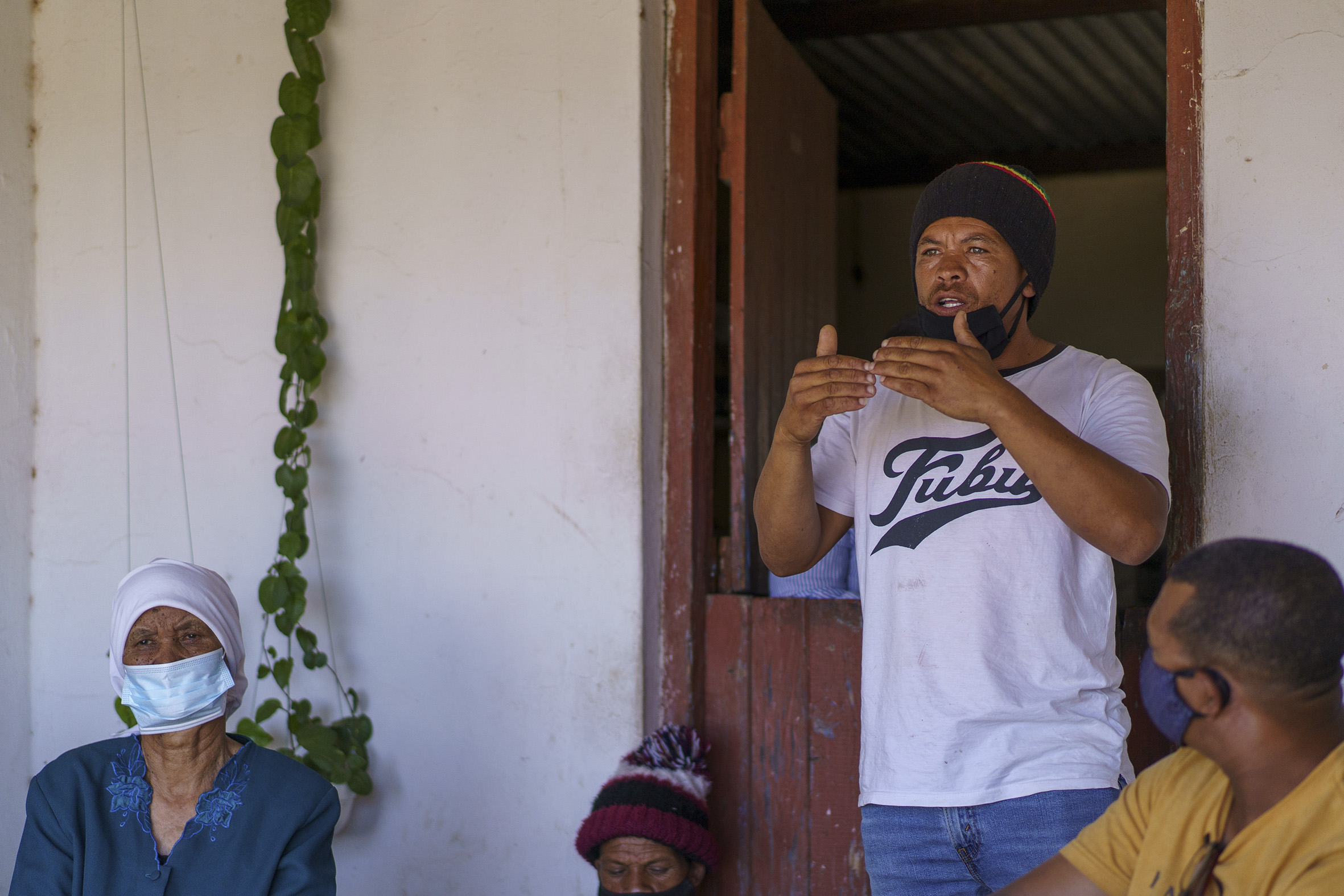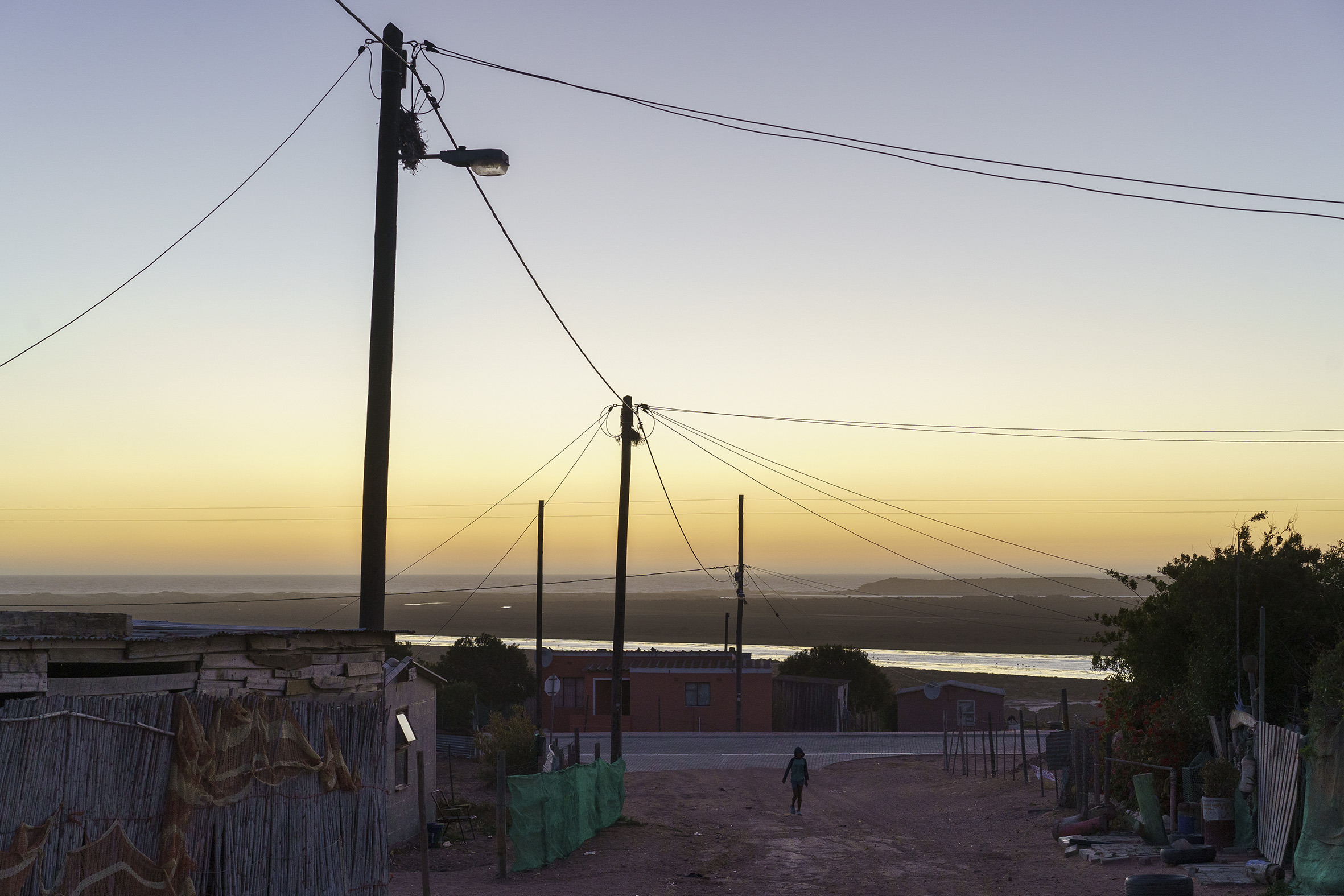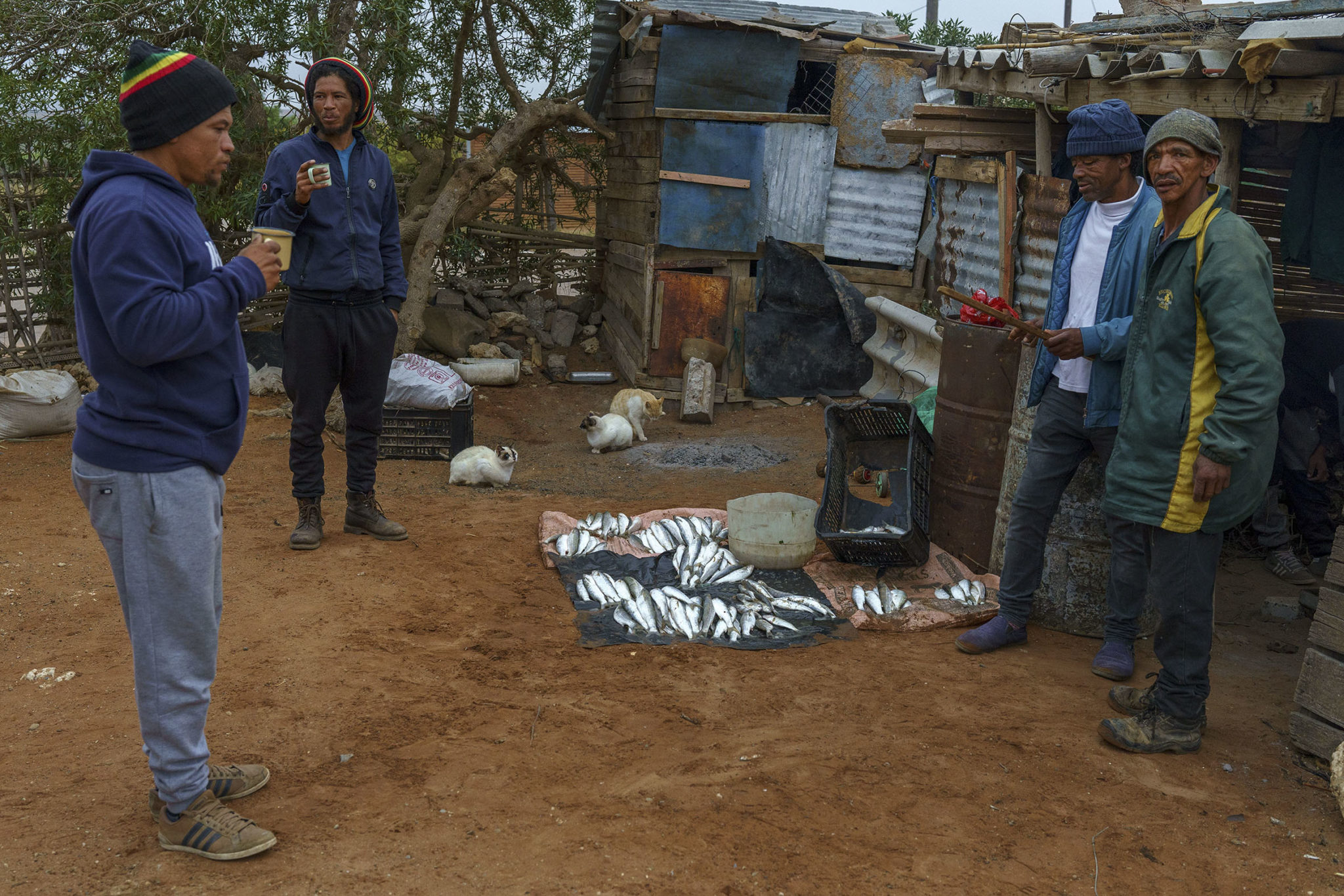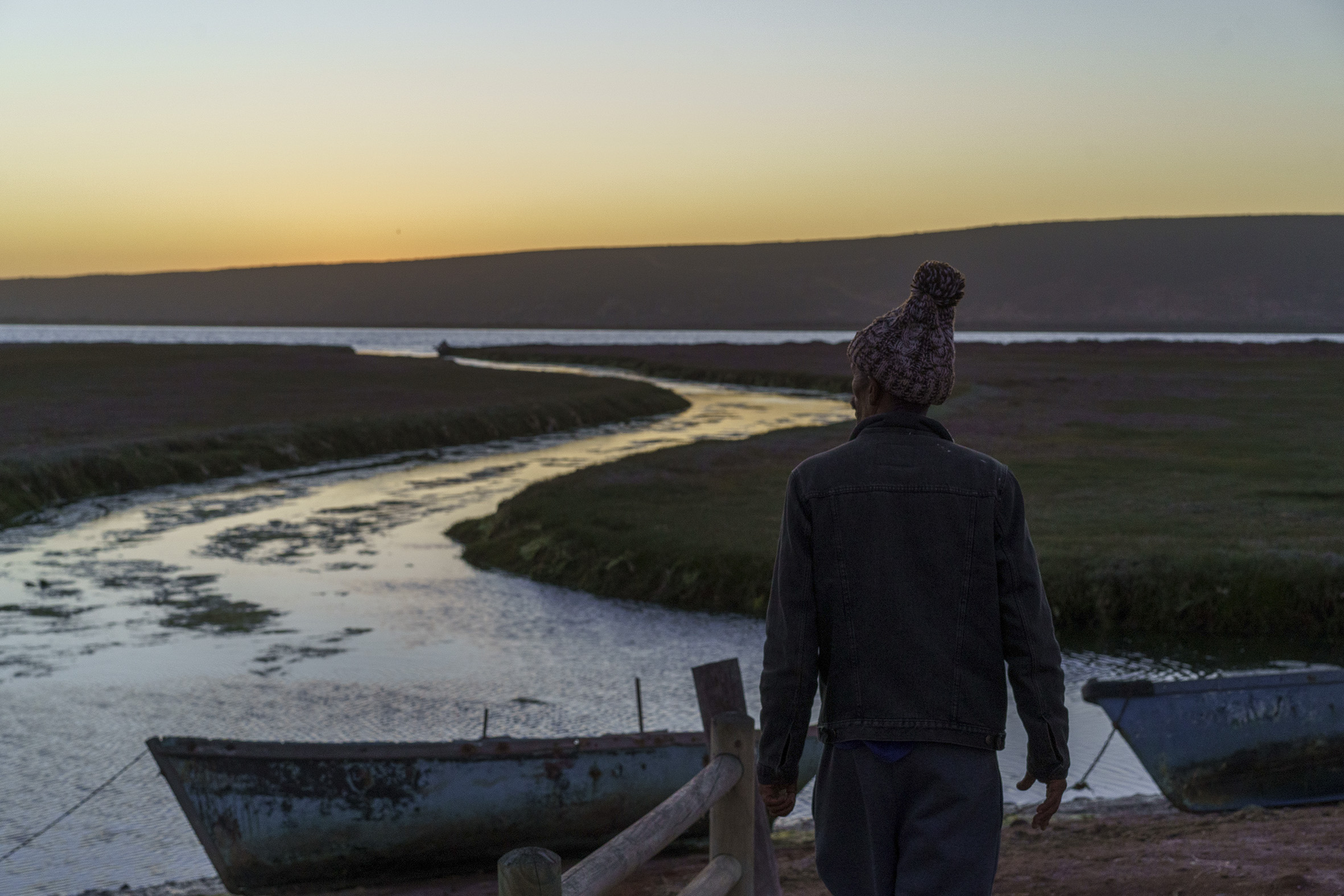The Olifants River mouth enters the Atlantic Ocean roughly 250km north of Cape Town, as the crow flies. At the mouth, the emerald waters are flanked by the cliffs of De Punt farm on the northern bank, while on the southern bank is the largest floodplain salt marsh in South Africa. The estuary is ranked third in the country in terms of conservation importance and is a critical source of food and livelihoods for many living in Papendorp and Ebenhaeser, two communities on the southern banks of the river.
On the morning of 21 November, the river was quiet. It was a Sunday and the fishers who had worked the night before had gone home with their catches. Cormorants were the only fishers that morning, swimming close to the river mouth and periodically catching fish.
“[The river is about] more than fishing,” said Rhiaan Coetzee, a fisherman who was born in Ebenhaeser. “It’s quiet. I can go there when I am stressed. You only hear the birds and the water. Even if there are no fish, there is that relationship with God and nature.”
Coetzee’s relationship with the river goes back to when he was a child. “When I was eight years old, I used to play at the river, then when I was 10, my father let me go with him on the boat. When I was 12, I had to start rowing.” Coetzee is now 32 and has been fishing on the river for 20 years.
 18 November 2021: Rhiaan Coetzee addresses the fishers at a meeting held at Antie Saartjie’s home in Ebenhaeser. (Photo: Barry Christianson)
18 November 2021: Rhiaan Coetzee addresses the fishers at a meeting held at Antie Saartjie’s home in Ebenhaeser. (Photo: Barry Christianson)
But that morning, the peaceful feelings associated with the river were tainted with anxiety.
The Department of Mineral Resources and Energy has granted Australian mining company Mineral Sands Resources the right to prospect for heavy minerals on the northern bank of the river. And Minister of Forestry, Fisheries and the Environment Barbara Creecy has dismissed appeals to stop the prospecting.
Creecy’s “recent decision to allow prospecting on coastal land on the northern banks of the Olifants estuary is difficult to understand”, says Merle Sowman, a professor in the environment and geographical studies department at the University of Cape Town (UCT). The prospecting is to take place on the farm remainder of Point #267 and Lot 615 Olifants River Settlement. “This is one of the most undeveloped estuaries in South Africa and has been identified as important for conservation.”
Sowman says the small-scale fishers who live along the river may find their source of food and livelihoods threatened.
From agriculture to fishing
The fishers of the Olifants River are descendants of the indigenous people who settled in the area now known as Lutzville in the 17th century. They were dispossessed of their land in 1925 and moved to Papendorp at the river mouth and Ebenhaeser about 15km upstream.
Their forebears made a living through cattle, agriculture and fishing. But the poor quality of the land near the river mouth to which they were relocated forced them to switch primarily to fishing.
Saartjie Afrika, known to all as Antie Saartjie, is 81 years old and has lived in Ebenhaeser all her life. Her grandparents were among those dispossessed of their land and by the time she was a young girl in the 1940s, her father had already switched to fishing.
 18 November 2021: Evening falls in Papendorp with the Olifants River mouth in the background. (Photo: Barry Christianson)
18 November 2021: Evening falls in Papendorp with the Olifants River mouth in the background. (Photo: Barry Christianson)
“I can tell you that I was raised from the river water. I got married in Ebenhaeser. When I had children, my husband was also a fisherman. My children were educated through the living we made from the river,” she said.
The fishers catch predominantly harder, also known as mullet. Coetzee calls it the staple food of the Olifants River fishing communities.
When plentiful, fishers sell their catches in the surrounding villages and even as far as Lambert’s Bay, 50km away. When the fish are scarce, fishers often still catch enough to cook for their families.
For the impoverished in these communities, being able to fish on the river is critical to their food security. Harder are caught in rowboats using gill nets. The river fishers don’t have to spend money on petrol or bait. “You need to know the weather, the wind and the tide. If you have that knowledge, you can take your boat on to the river and you’ll know where to drop your net to get some fish,” said Antie Saartjie.
Protected by the community
The fishers understand the value of the river in their lives and want it protected. However, they objected to the first plan to make it a marine protected area as it did not take them into account — the plan attempted to restrict fishing in the first 16km of the river.
Coetzee, who was very young at the time, speaks of that attempt as “the first time they tried to close the river”. He can remember his father sitting him down and telling him that when he grew up, he would have to protect the river as outsiders would try and get rid of the fishers.
“I feel strongly that the river needs to be protected,” echoed Antie Saartjie, “but at the same time there needs to be access for our people to work for a living. [Our people] must protect it. There must be laws that prevent people from coming and damaging it.”
Assisted by the Legal Resources Centre and researchers from UCT, they put forward a proposal for a community-managed marine protected area, which was adopted by all stakeholders. While it is taking longer than the communities had hoped, plans driven by governmental organisation Cape Nature are underway to declare the mouth of the river a marine protected area that will be co-managed by the fishing communities and the Ebenhaeser Communal Property Association, which oversees the newly restituted land.
Papendorp resident Aletta Goliath said they have an influx of holidaymakers to the river mouth every year. “We won’t be able to keep them away because it’s tradition.” This tradition started during apartheid, when the Olifants River mouth and the beach south of it were among the few places non-whites could go.
But “when the marine protected area gets finalised, there will be oversight and we will be able to regulate” activities on the river, said Goliath. Residents are anxious for this to happen as harder are sensitive to these disturbances during the festive season, from the crowds and the motorised boats piloted by visitors to the farms on the northern bank. Goliath said there is a stark drop in their catches at this time.
Knowing this, the fishing communities are concerned that the machinery used to prospect on the northern banks may deter the harder from entering the river mouth, jeopardising their livelihoods and threatening their food security.
Creecy’s decision to allow prospecting doesn’t acknowledge the process underway to have the river mouth area declared a community-managed marine protected area.
 19 November 2021: “When the Marine Protected Area is finalised, there will be oversight and we will be able to regulate [activities on the river],” says Aletta Goliath. (Photo: Barry Christianson)
19 November 2021: “When the Marine Protected Area is finalised, there will be oversight and we will be able to regulate [activities on the river],” says Aletta Goliath. (Photo: Barry Christianson)
“A major problem with the current decision-making is that the cumulative impacts of all these prospecting and mining activities are not assessed,” says Sowman. Prospecting applications are submitted and assessed on an ad-hoc basis and while the impact of one particular operation may be minimal, combined with other prospecting and mining activities in and around the area it may be significant.
In addition to Mineral Sands Resources’ prospecting activities on the northern bank, there are applications for prospecting on the newly restituted southern banks. And the mineral resources department has authorised offshore prospecting in five concessions, one of which is in front of the Olifants River mouth.
Sowman says there is a need for a coastal plan that “identifies environmental attributes and sensitive areas that need to be protected, and areas where mining could be feasible”. Such a plan would protect areas like the Olifants River from mining because of their conservation importance. But because there isn’t one, companies have been applying for mining and prospecting rights all along the West Coast, from Elands Bay into the Northern Cape province.
 21 November 2021: The Olifants River seen from the Point Farm. (Photo: Barry Christianson)
21 November 2021: The Olifants River seen from the Point Farm. (Photo: Barry Christianson)
“If you allow prospecting and it yields positive results, the next step is to apply for a mining right. The issue here is that by allowing prospecting, the government is giving a signal to the applicant that there is in-principle support for mining in that area.”
Should mining go ahead, “it could lead to irreversible environmental damage to important resources” such as critical biodiversity areas, marine habitats and resources, heritage, agricultural lands and palaeontological resources, she says.
Another concern is that mining operations lead to a build-up of sand in the river mouth, as the communities suspect has happened on beaches north of the mouth. Goliath said they are also worried about their air quality should mining go ahead on the northern bank, as a predominant northwesterly wind blows across the river to Papendorp and Ebenhaeser. And that the restriction of access to land where mining operations are underway will interfere with how the communities are able to use their newly restituted land.
Sowman says it could “foreclose future options for longer-term sustainable livelihoods and jobs for the people of this area”.
Endangered culture
That morning, at 6am, before heading out to the river, Coetzee visited his neighbour, Chris Don. Don had just returned from fishing on the river the night before. He had caught about 200 harder. An atmosphere of excitement hung in the air. Coetzee said there had not been fish for a few days, but that the wind had turned from northwesterly to southwesterly and they expected to see harder in the river soon.
 21 November 2021: From left: Rhiaan Coetzee and Wilbur Cloete drink tea, as Chris Don sees to the fish he caught the night before. (Photo: Barry Christianson)
21 November 2021: From left: Rhiaan Coetzee and Wilbur Cloete drink tea, as Chris Don sees to the fish he caught the night before. (Photo: Barry Christianson)
In Don’s yard, the fish were laid out on mesh bags while two men manned a fire, braaing them. Cats sat nearby waiting for scraps or small fish to be tossed their way. Don was busy in his shed, salting fish with the salt he had collected from one of the pans next to the river. Later, he would hang them in the sun to make salted and dried bokkom.
On the way from Don’s home to Papendorp, Coetzee let people know that Don had caught harder the night before. Some bought fish because they enjoy them, others because at R1 or R2 each it is their most affordable source of protein. DM
 21 November 2021: “My father said, the day we lose this river is the day we will be hungry,” said Wilbur Cloete who lives in Ebenhaeser. (Photo: Barry Christianson)
21 November 2021: “My father said, the day we lose this river is the day we will be hungry,” said Wilbur Cloete who lives in Ebenhaeser. (Photo: Barry Christianson)




 21 November 2021:
“My father said, the day we lose this river is the day we will be hungry,” said Wilbur Cloete who lives in Ebenhaeser. (Photo: Barry Christianson) FOR ONCE OFF USE ONLY
21 November 2021:
“My father said, the day we lose this river is the day we will be hungry,” said Wilbur Cloete who lives in Ebenhaeser. (Photo: Barry Christianson) FOR ONCE OFF USE ONLY 